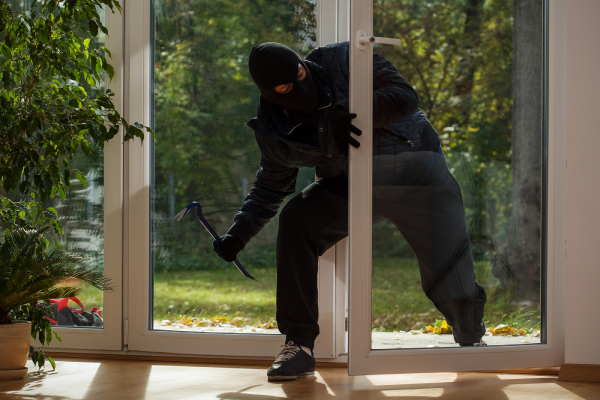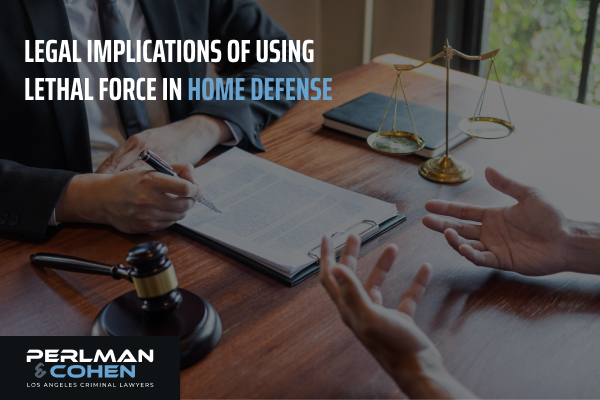
When someone breaks into your home, it's more than just a property crime; it feels like a violation of your safety and privacy. Many people wonder if they have the right to defend themselves in such a situation, including using a gun. The laws around self-defense, especially in California, are specific and require understanding.
Knowing your rights and the legal boundaries of defending yourself and your home is crucial. We can review your situation at Perlman & Cohen Los Angeles Criminal Lawyers, and provide a strong defense.
California law gives you the right to defend yourself and your property, but there are limits to this right. You can't just shoot someone for trespassing. The situation must meet certain criteria for using deadly force to be considered legal.
Our legal team is here to help you understand your rights and guide you on what to do if you ever find yourself in such a frightening scenario.
In California, the law recognizes your right to defend yourself if you believe you're in imminent danger of being hurt or killed. This means you can use force to protect yourself, but that force must be reasonable and necessary for the threat you face.
It's not a free pass to act whatever you want; you must genuinely believe you're in danger. Plus, the force you use must match the threat level.
Self-defense can include defending yourself in your own home, which leads to what's commonly known as the "castle doctrine." This principle allows you to use even deadly force to protect yourself from intruders.
However, the belief that you're in danger must be reasonable. You can't shoot someone running away or no longer a threat.
California's laws provide a legal foundation for protecting your home and yourself from intruders. The law understands your home as your sanctuary, where you have every right to feel safe and secure.
If someone forcefully and unlawfully enters your home, you're presumed to have a reasonable fear of great bodily harm to yourself or others. This presumption is a key part of justifying using force in self-defense.
However, the use of force in home protection is subject to scrutiny. You must prove that you had a reasonable belief that the force was necessary to prevent serious bodily injury or death.
The law requires that your response be proportional to the threat. Excessive force, beyond what's necessary to neutralize an immediate threat, can lead to legal consequences.
The castle doctrine in California allows residents to use deadly force within their homes if they have a reasonable fear of imminent peril of death or serious bodily injury.
If someone breaks into your house, you have the right to defend yourself without the duty to retreat. The intruder's unlawful and forceful entry into your home is enough to presume that you have a reasonable fear for your safety and those in your home.
However, this doctrine has its limitations. You can only use such force if there's a direct and immediate threat. If the intruder is fleeing, or there's a way to avoid using deadly force safely, the law expects you to take those options.

Even in your own home, the law sets boundaries on deadly force. You can't use deadly force unless you plan to prevent imminent death or serious bodily injury. The law also considers whether such force was necessary and whether any reasonable alternatives were available. Be aware of these conditions to ensure your actions stay within the legal framework of self-defense.
Furthermore, after using force, you have certain obligations. You must report the incident to law enforcement officers as soon as possible. Not doing so can lead to complications and suspicions about the legality of your actions. Communicating clearly and cooperating with law enforcement is crucial while ensuring you protect your legal rights.

When you use deadly force in self-defense, especially in your home, can lead to serious legal implications. While the law offers protections under the castle doctrine, each case is subject to intense scrutiny. The circumstances of the incident, your actions, and the perceived threat will all be closely examined to determine if the use of force was justified.
If you've used physical force in home defense, you might face charges ranging from manslaughter to murder if the prosecution believes the force was not justified. However, you can claim self-defense as an affirmative defense. This means you acknowledge the act but argue it was justified under the circumstances.
Your criminal defense attorney will work to prove that your actions met the legal criteria for self-defense, focusing on the reasonable belief of imminent threat and the proportionality of the force used.
Another potential defense is the castle doctrine, specifically addressing situations where someone unlawfully and forcefully enters your home. This doctrine can provide a strong basis for defending your actions, assuming they fall within the legal parameters for using lethal force in self-defense.
Both self-defense and the castle doctrine emphasize the importance of constructing a solid defense strategy. Our team gathers evidence, interviews witnesses, and consults experts to support your case. We focus on proving the reasonableness of your fear and the necessity of your actions.
Furthermore, we explore all possible defenses, from demonstrating the legality of your actions under the castle doctrine to challenging the prosecution's evidence.
While this differs from the stand-your-ground law, deadly physical force could still be justified in some situations. We aim to build a comprehensive defense addressing every incident aspect and your actions.

Facing legal proceedings after defending yourself in your home can be overwhelming. But you don't have to go through it alone. Perlman & Cohen Los Angeles Criminal Lawyers are here to help.
Our experienced team understands the complexities of self-defense laws and is ready to support you every step of the way. If you are accused of using unlawful force with a deadly weapon, you need a strong legal defense. Contact us today to schedule a free case consultation.